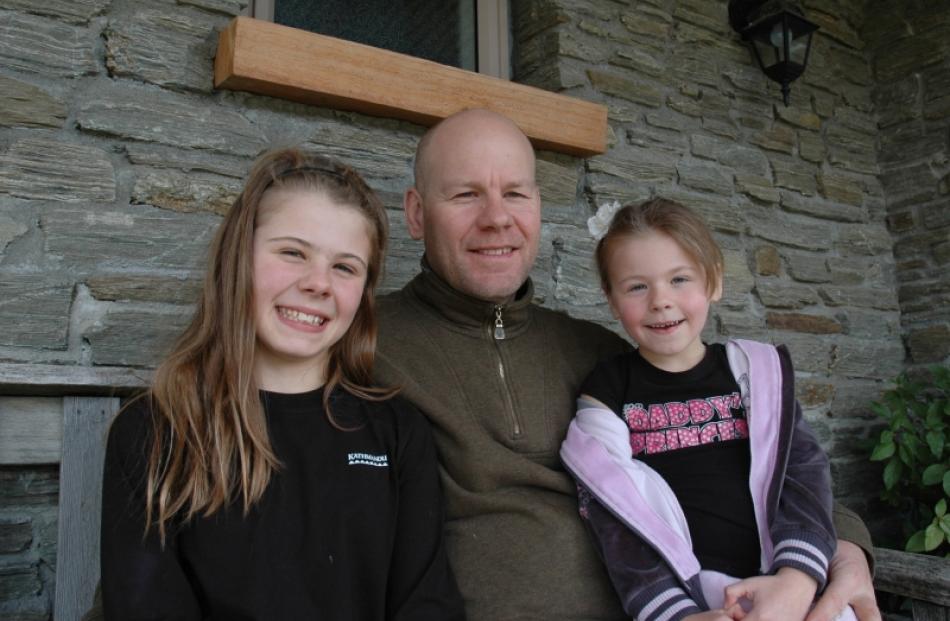Damian Russel has been involved in fly-in, fly-out work, mainly in Australia, since the early 1990s.
His jobs have ranged from drilling and blasting in mines to project management. Now he's turned his back on the big money to be closer to his family.
Instead of flying to and from Australia, the 46-year-old father of two now commutes between his home in Central Otago and Christchurch, where he is involved in civil construction.
"I've worked at mines at Macraes and Waihi and in mines in New South Wales and West Australia, so I've had a pretty good look around.
"Now, you could argue I'm in a worse position because I'm working in Christchurch Monday to Friday and going home weekends, so I possibly see my kids less doing this. I still live in Alex, so I'm still commuting.
"However, one of the things I think that needs to get across to the public is the issue with time zone differences when you're doing fly-in, fly-out work.
"My kids start school at 9am, but Perth is five hours behind. That means if I wanted to talk to them before they started school, I'd have to be up at 3.30am; it's just not viable.
"Then you come home after a 12-hour shift and they'll be asleep. So you try to talk to them on a noisy cellphone from a noisy site, which is not perfect.
"Anyone who has done this type of work gets really agitated if they can't speak to their families. If you've had a bad day or your wife has had a bad day and she's trying to talk to you while the phone is breaking up because you're in the middle of nowhere ... it can be very stressful.
"Or if your kid breaks an arm doing water-skiing or netball or whatever, you feel the distance.
"Perth is the most isolated city in the world and you feel that isolation when that happens."
Mr Russel's most recent Fifo job, a civil construction role with mining giant Rio Tinto at Cape Lambert, West Australia, involved a tough rotation comprising four weeks on and one off.
He has had others, too, ranging from 50:50 splits (two weeks on, two weeks off) to 21 days on and 10 days off.
"If you are starting off in mining, you might work four weeks on, one week off to get a foot in the door, but I'd never do a roster like that again," Mr Russel says.
"People need to understand that if you go and do this stuff, it isn't fun. You aren't over there having a whale of a time.
Everyone feels sorry for the wife and kids, but poor old dad - or mum - is over there grafting in extreme conditions, in an environment that is heavy with safety issues. And you live in a room the size of a toilet.
"Some camps can be great; some have gyms and swimming pools and tennis courts now, but the heat takes a long time to get used to and if you are in a camp where the food isn't that good ... well, that can be real drama."
Mr Russel says Fifo-style arrangements might be great for some, particularly single people, but those with children should think long and hard about the implications of such work on their families.
"If you've got kids, you need to consider whether the money is worth not being around. Being away is a constant battle for me.
"I've had a lot of people ask me why I don't just move to Australia, but the fact is if we all moved to Perth, I'd still be working away from my family.
And my kids and wife would have to move away from their friends and other family, change schools ... their social network would be gone.
"We made a choice that it would be better if it was just me who made the social sacrifice. I love Central Otago and wouldn't want to live anywhere else or have my kids live anywhere else.
"There are other costs, too. I was going to coach rugby this year. I really wanted to do it but you end up just doing some half-pie job.
"You need to be clear about the reasons why you're doing this; you need to be clear about what the outcomes are going to be.
"I've worked with lots of people who have turned up, worked a week and said ... `this isn't for me'. It's certainly not for everybody."













